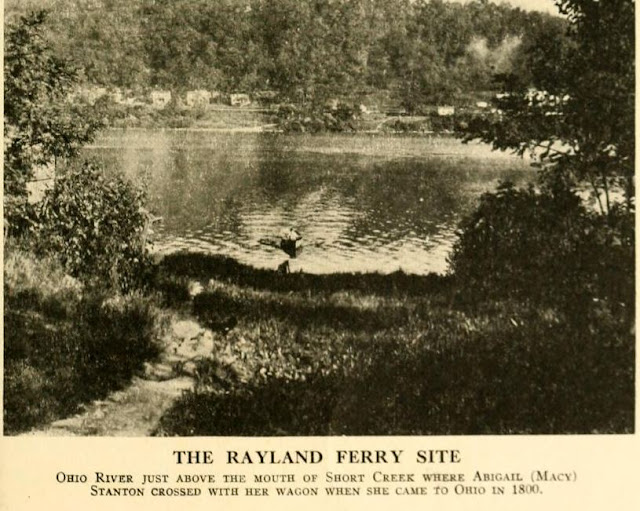 In 1919, Robert Smith, Barnesville, Ohio, wrote, “Soon after her husband’s death, Abigail Stanton turned her face towards the remote and almost unexplored wilderness west of the Ohio River. She made the journey with a considerable body, all members of the Society of Friends, who, like herself, felt the gall of slavery’s presence too keenly to remain under its shadow. They crossed the river at Portland, now known as Rayland. The trees had to be felled before the teams could proceed. Abigail Stanton’s wagon is said to have been the first to enter this section of the country. They got to Concord, now called Colerain, by First-day. Here they stopped, rolled some logs together, sat down, and felt they had a very good meeting.
In 1919, Robert Smith, Barnesville, Ohio, wrote, “Soon after her husband’s death, Abigail Stanton turned her face towards the remote and almost unexplored wilderness west of the Ohio River. She made the journey with a considerable body, all members of the Society of Friends, who, like herself, felt the gall of slavery’s presence too keenly to remain under its shadow. They crossed the river at Portland, now known as Rayland. The trees had to be felled before the teams could proceed. Abigail Stanton’s wagon is said to have been the first to enter this section of the country. They got to Concord, now called Colerain, by First-day. Here they stopped, rolled some logs together, sat down, and felt they had a very good meeting.“The Stantons located one mile west of Mount Pleasant, Ohio, on a tract of land containing four hundred and eighty acres. Surrounded by the difficulties of pioneer life, Abigail established a home under an administration so wise that as her children grew and passed out into the world, it was to positions of honor and usefulness.
“Her son Henry was the first person to do his harvesting in Mount Pleasant Township, Jefferson County, Ohio, without furnishing his men with liquor. He told them one morning that he felt that he could not do it. They all left, but two of them came back the next morning and with some other help he got his harvesting done more easily than usual.”
_______________________________________________________________________
In 1919, Byron Stanton, Cincinnati, Ohio, wrote, “Of the children of Benjamin and Abigail Stanton, all except David married members of the Society of Friends. At the time of the division of that Society, Sarah Williams and Henry Stanton and their families sided with the branch called Orthodox and the others with the branch known as Hicksites.
“Of the eighty-two grandchildren of Benjamin and Abigail, sixty-eight arrived at the age of majority, fourteen died between the age of a few months and seventeen years.”
_______________________________________________________________________
An unknown author wrote, “Abigail Stanton was a widow twenty-seven years. She had in her time five broken bones, the first when thirty years old. She, with her husband and other Friends, were going horseback to New Garden to attend their Yearly Meeting, a distance of two hundred miles. When they were about half way there, her creature stumbled and threw her off and broke her wrist. They splintered it with oak leaves and she put it in a sling and sent on, rather than be left alone or have her husband stay from meeting.
“About the year 1794 she fell at the doorstep and broke her ankle very badly. Then, soon after she came to Ohio, she was going to a neighbor’s and went to get over the fence and the top rail rolled off and threw her back and she fell on her wrist and broke it. Some time between that and 1810 she got on horseback and the horse reared and threw her off, breaking both bones of one leg below the knee, which always remained crooked, so she used a crutch or crutches as long as she lived.
“The summer of 1810 she [about 57] was walking in the yard and fell and broke her thigh, but with all her cripplements she rode on horseback. I well remember seeing her and father start off to ride eight miles to Harrisville about three weeks before her death [1825 at 82]. She rode on one creature and he or another, carried her crutch and in a pair of leather saddle bags on the saddle under him was her wardrobe, a very common way of transportation in those days."
______________________________________________________________________
Debora H. Webster wrote, “Great-great-great-grandmother Abigail (Macy) Stanton, when she and her children were moving from North Carolina to Ohio, camped at night. Grand-mother, to make her Quaker bonnet safe for the night, pulled down a limb of a nearby tree and tied her bonnet to it. During the night the bonnet was stolen and she had to continue her journey without one.”
